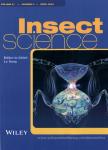Systemic RNAi of V-ATPase subunit B causes molting defect and developmental abnormalities in Periplaneta fuliginosa
VATPase 子单元 B 的全身的 RNAi 在 Periplaneta fuliginosa 引起 molting 缺点和发展畸形作者机构:Laboratory of Nematology Department of Applied Biological Sciences Saga University Honjo 1 Saga Japan The United Graduate School of Agricultural Sciences Kagoshima University Korimoto 1-21-24 Kagoshima Japan Department of Biomedical Sciences College of Life and Health Sciences Chubu University Kasugai Aichi Japan Department of Environmental Biology College of Bioscience & Biotechnology Chubu University Kasugai Aichi Japan
出 版 物:《Insect Science》 (昆虫科学(英文版))
年 卷 期:2019年第26卷第4期
页 面:721-731页
核心收录:
学科分类:0710[理学-生物学] 07[理学] 09[农学]
基 金:supported by the research fund from the Research Institute for Biological Function Chubu University
主 题:Blattodea cockroach molting Periplaneta fuliginosa RNA interference vacuolar-type H+-ATPase
摘 要:The vacuolar (H+)-ATPases (V-ATPases) are ATP-driven proton pumps with multiple functions in many organisms. In this study, we performed structural and functional analysis of vha55 gene that encodes V-ATPase subunit B in the smokybrown cockroach Periplaneta fuliginosa (Blattodea). We observed a high homology score of the deduced amino acid sequences between 10 species in seven orders. RNAi of the vha55 gene in R fuliginosa caused nymphal/nymphal molting defects with incomplete shedding of old cuticles, growth inhibition, as well as bent and wrinkled cuticles of thoraxes and abdominal segments. Since growth inhibition caused by vha55 RNAi did not interfere in the commencement of cockroach molting, molting timing and body growth might be controlled by independent mechanism. Our study suggested V-ATPases might be a good candidate molecule for evolutionary and developmental studies of insect molting.



